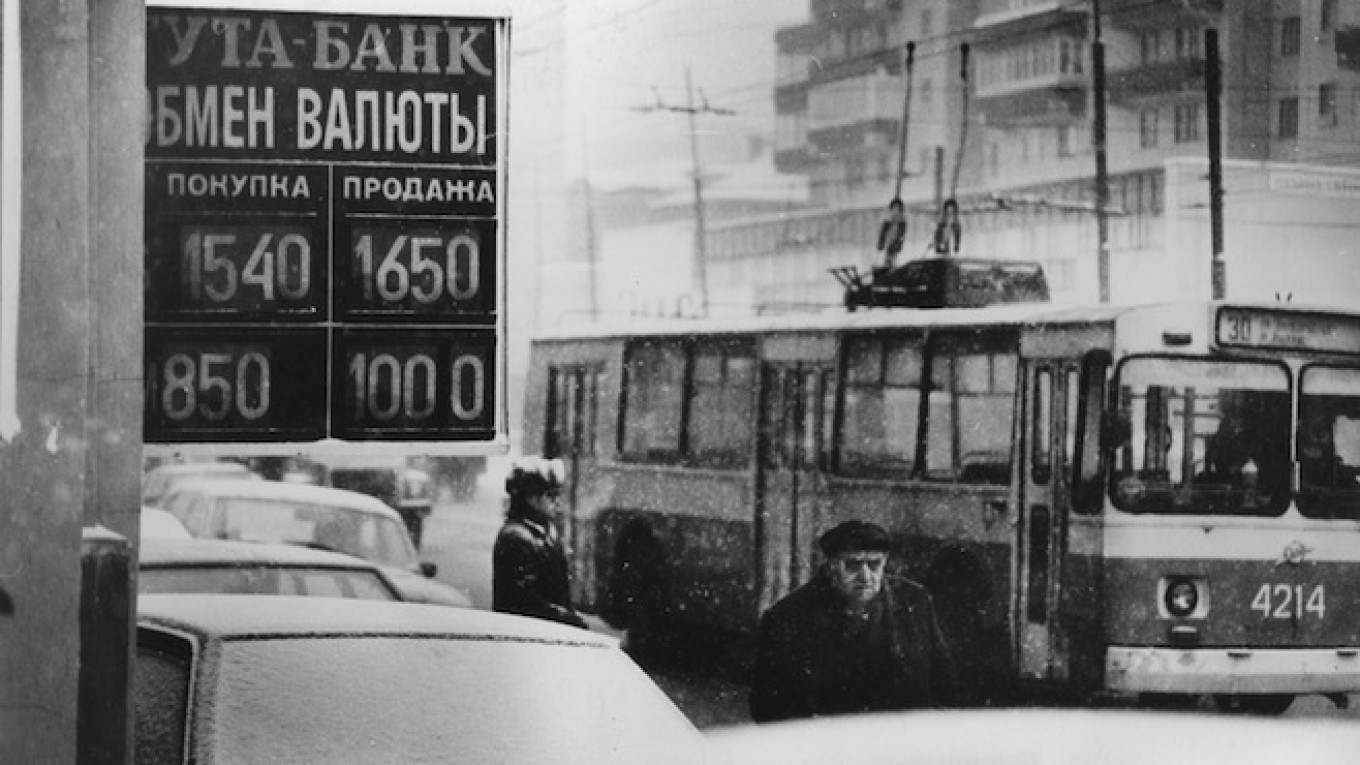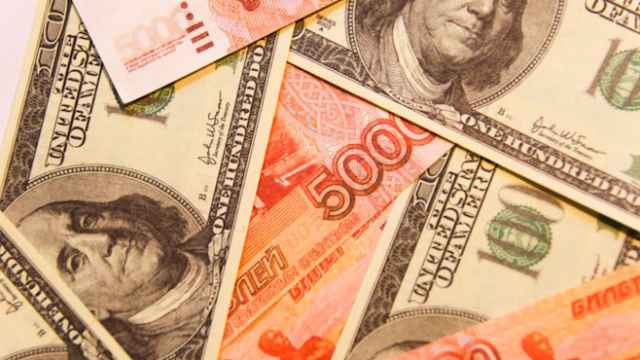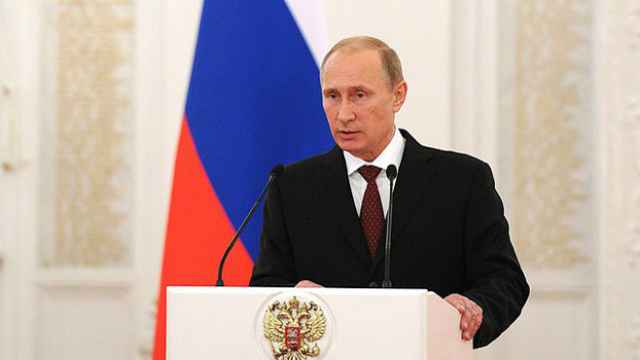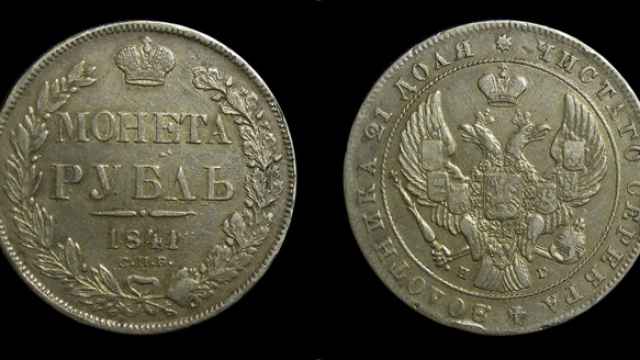Along with the flashy cars of the new rich and the garbage bin food scavenging of the new poor, a distinctive sign of Russia in the 1990s were store price tags in a non-official currency — “u.e.”
Amid the decade's economic upheavals, when the ruble could bleed chunks of value overnight, the u.e. — which stands for the Russian words “uslovnaya yedinitsa,” or “conditional unit” and is pronounced “oo-yeh” — was a response by storekeepers to soaring inflation and a way to avoid having to replace price tags on a daily basis. The u.e.-to-ruble exchange rate was pegged to the U.S. dollar.
As the economy stabilized, the conditional currency mostly disappeared, replaced by the familiar ruble, and the u.e. was relegated to a memory of a bygone turbulent era. Aside from a brief comeback in the 2008-09 economic crisis, the conditional unit disappeared from view.
Until now.
With the ruble down almost 50 percent against the dollar so far this year — and over 14 percent just in the past three trading days — the u.e was back in circulation this week, certainly as a rumor and possibly as tender.
Moscow radio station Govorit Moskva on Sunday reported spotting prices at a hardware store in the capital's suburb of Khimki listed in the infamous conditional units. The radio station also posted photographs of the price tags on its website.
The report prompted a flurry of speculation and reprints on Russian social media and news websites.
The government's official newspaper Rossiiskaya Gazeta published an online report late Sunday night suggesting that the rumors were false — but stopping just short of saying so outright.
“Rumors about a switch to conditional units have indeed appeared,” the head of the online trade department at Russia's Association of Electronic Commerce, Ivan Kurguzov, was quoted as saying. “A range of Internet stores are thinking about switching to u.e. or intend to change their price tags several times a day.”
Rossiiskaya Gazeta said it had checked the websites of “popular Internet shops,” and found no trace of u.e.-denominated prices.
The problem was that in some cases there were no prices in rubles, either.
The website of a hardware store in Khimki, ArtReality.ru, when checked by The Moscow Times early Monday, offered dashes instead of prices for items added to an online shopping cart, and a note asking customers to leave their phone number so that a “manager” could contact them to “agree on the price.”
In a twist for the Russian government, the 1990s-reminiscent reports of the u.e.'s reemergence appeared as Prime Minister Dmitry Medvedev published an op-ed article in the Nezavisimaya Gazeta newspaper on Monday predicting a replay of the turbulent 1990s — for Ukraine.
The economic troubles afflicting Ukraine as government forces and pro-Moscow separatists fight in the country's east mean that “apparently, our neighbors will have to live through a second '90s,” Medvedev said in the article.
Cheerless as Ukraine's economic situation might be, prospects are also dim for Russia. A combination of Western sanctions over the Ukraine crisis, capital flight and a steep drop in the price of oil, Russia's key export, have not only almost halved the value of the ruble currency, but have flattened already faltering economic growth and sharply raised inflation.
But store owners considering listing prices in u.e. are not allowed to ditch the ruble entirely.
“Under the law, the customer must be informed about prices in rubles,” Rossiiskaya Gazeta quoted Dmitry Yanin, the head of an association of consumers' groups, as saying. “That is, the stamped price tag must be in rubles. But nobody prohibits listing next to it the price in dollars or euros. Or even in [Chinese] yuan! This would not be considered a violation of the law.”
But Moscow's government upped the ante on Monday, with City Hall's trade and services chief Alexei Nemeryuk saying that prices must be displayed “exclusively only in rubles,” and that price tags in u.e. would be removed, news agency RIA Novosti reported.
By the early 2000s, when the u.e. survived only in some business contracts and posh car dealerships, the exchange rate for the units stopped matching that of the dollar, and began to correspond to that of the euro. That meant higher prices, as the euro was gaining in value.
Radio station Govorit Moskva did not specify whether the u.e. at the Khimki store was pegged to the dollar or the euro.
But the explanation for the switch to oo-yehs was familiar from the 1990s: Listing prices in rubles would mean changing price tags several times per week to minimize losses from the depreciating ruble, store employees said, according to the report.
Contact the author at bizreporter@imedia.ru
A Message from The Moscow Times:
Dear readers,
We are facing unprecedented challenges. Russia's Prosecutor General's Office has designated The Moscow Times as an "undesirable" organization, criminalizing our work and putting our staff at risk of prosecution. This follows our earlier unjust labeling as a "foreign agent."
These actions are direct attempts to silence independent journalism in Russia. The authorities claim our work "discredits the decisions of the Russian leadership." We see things differently: we strive to provide accurate, unbiased reporting on Russia.
We, the journalists of The Moscow Times, refuse to be silenced. But to continue our work, we need your help.
Your support, no matter how small, makes a world of difference. If you can, please support us monthly starting from just $2. It's quick to set up, and every contribution makes a significant impact.
By supporting The Moscow Times, you're defending open, independent journalism in the face of repression. Thank you for standing with us.
Remind me later.






